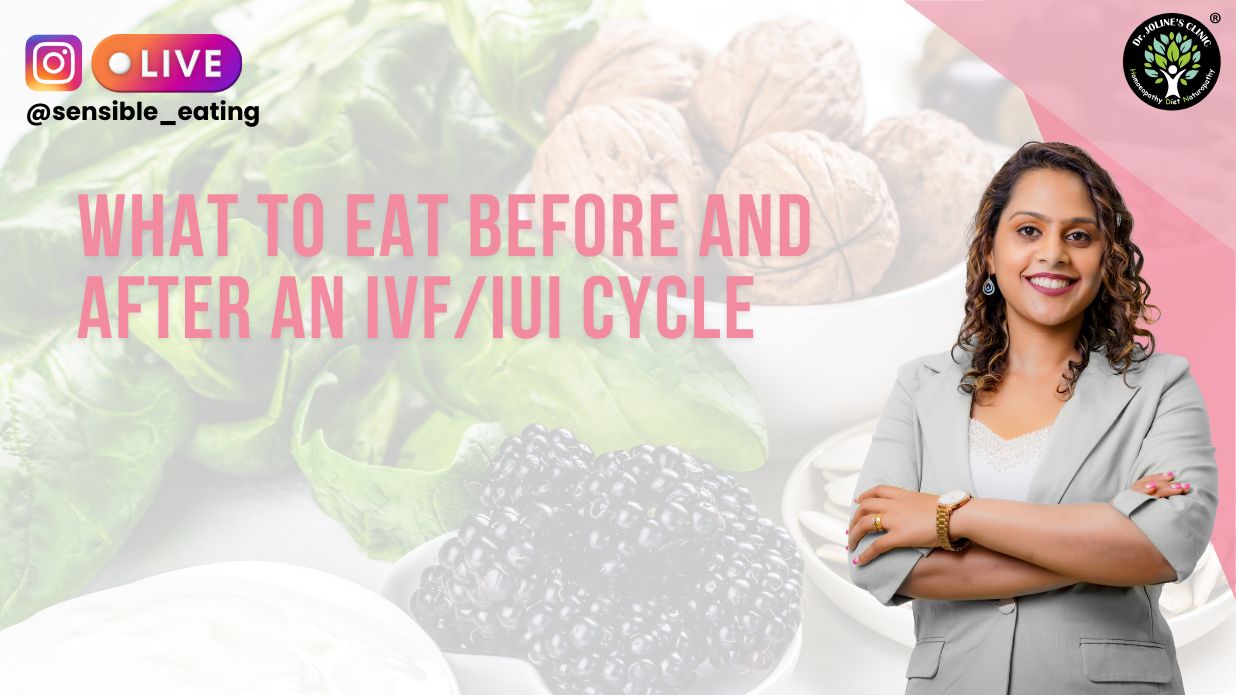Nutrition for IVF & IUI: How the Right Diet Can Support Fertility Treatment Success
For couples undergoing fertility treatments like IVF (In Vitro Fertilisation) or IUI (Intrauterine Insemination), the journey can often feel overwhelming and filled with uncertainty. While medications, scans, and procedures take center stage, one crucial factor often gets overlooked—nutrition.
Fertility experts now agree that what individuals eat before and during fertility treatments plays a vital role in influencing treatment outcomes. The focus is no longer just on medical protocols but on creating an internal environment that supports egg quality, sperm health, hormonal balance, uterine lining development, and embryo implantation.
Why Nutrition Matters During IVF and IUI
While IVF and IUI are highly scientific processes, they still rely on the body’s biological functions. Egg and sperm quality, hormonal balance, uterine lining thickness, and implantation success all depend on physiological processes deeply influenced by nutrition and lifestyle choices.
Here’s why:
- Poor nutrition increases inflammation, leading to poor egg and sperm quality.
- Nutrient deficiencies reduce implantation chances and hormonal stability.
- Compromised gut and liver health affect hormone clearance, causing imbalances that hinder conception.
In simple terms, good nutrition creates a fertile soil for the seed (embryo) to grow.
The Four Core Nutrition Areas for Fertility Support
Fertility-focused nutrition isn’t just about eating “healthy” in a general sense. There are four key focus areas essential for those undergoing IVF and IUI:
1. Improving Egg and Sperm Quality
Sperm and egg cells need approximately 90 days to mature, meaning the food consumed in the three months before treatment can directly influence the outcome.
Key nutrients: Antioxidants, healthy fats, and B vitamins.
Recommended fertility-supportive foods include:
- Ghee
- Eggs (for those who consume them)
- Pumpkin seeds and walnuts
- Local seasonal fruits and vegetables (including berries—fresh or frozen)
2. Supporting Hormonal Balance
Stable hormones are crucial for both egg maturation and endometrial receptivity.
Common triggers for hormonal imbalance include blood sugar fluctuations and chronic stress.
Nutrition tips for hormone balance:
- Avoid skipping or delaying meals
- Pair carbohydrates with protein or healthy fats
- Limit excessive caffeine and processed sugar
- Focus on warm, cooked meals over raw salads, especially during treatment phases
3. Enhancing Uterine Lining & Implantation
For successful implantation, the body needs good circulation, adequate iron, and vitamin E.
Fertility-enhancing foods for uterine health include:
- Beetroot
- Sesame seeds
- Dates
- Whole grains such as rice and millets
- Turmeric (supports circulation and reduces inflammation)
4. Optimising Gut and Liver Function
The gut is responsible for nutrient absorption, and the liver plays a key role in hormone detoxification and balance.
Simple strategies to support gut and liver health:
- Start the day with plain water
- Include soaked almonds and figs
- Add fermented foods like homemade curd and buttermilk (if well tolerated)
- Avoid heavy, oily, or fried foods, especially around egg retrieval or embryo transfer days
Common Nutrition Mistakes During IVF and IUI
Several nutrition mistakes can unknowingly reduce fertility treatment success:
🚫 Skipping meals to lose weight
🚫 Over-reliance on green juices or raw salads
🚫 Taking excessive supplements without lab testing
🚫 Ignoring male partner nutrition—even though male factor fertility is 50% of the equation
Frequently Asked Questions (FAQs)
✔ Not at all. Even small dietary changes during ovarian stimulation, egg retrieval, or the two-week wait can improve egg quality, hormone stability, and uterine lining thickness.
✔ Yes. These are the exact conditions where fertility-focused nutrition makes the biggest impact. While IVF and IUI are powerful tools, the body still needs to ovulate, implant, and nourish an embryo—all of which depend on nutrient intake, meal timing, and hormone support.
✔ Absolutely. Fertility is not about body weight or how “clean” a diet appears. What matters is whether the body is absorbing nutrients effectively, maintaining hormonal balance, and supporting cellular health.
✔ Yes. Research shows that sperm health can improve within 90 days with the right combination of healthy fats, zinc, antioxidants, and lifestyle adjustments. A tailored couple fertility nutrition program addresses both partners for the best possible outcome.
✔ No. Sustainable fertility plans are built around local, seasonal, and traditional Indian foods. Rather than eliminating staples, nutrition plans focus on optimising food choices, meal timings, and nutrient combinations.
✔ Ideally, immediately. Since egg and sperm quality take 90 days to mature, starting now gives the body ample time to correct deficiencies and build a more fertile internal environment.
✅ Personalised fertility meal plans
✅ Nutrition support for both partners
✅ Regular check-ins and WhatsApp guidance
✅ Blood test review and supplement suggestions
✅ Focus on real, traditional foods—no fad diets, no extreme cleanses
Many couples working through this program have even conceived naturally during the preparation phase, prior to starting IVF or IUI treatments.
Nutrition—The Missing Piece in Your Fertility Journey
While IVF and IUI address the medical side of conception, nutrition lays the foundation for success.
Supporting the body with the right foods helps create an internal environment that is calm, nourished, and receptive, increasing the chances of a positive pregnancy outcome.
Missed the Live Session? Watch it now!
If you missed the recent live session on fertility nutrition for IVF & IUI, don’t worry!
👉 Click here to watch the full session and get all the valuable insights shared by Dr. Joline Fernandes.
Ready to Take Control of Your Fertility Journey?
Start your personalised fertility nutrition program today! Helping couples nourish their way to parenthood, naturally.
